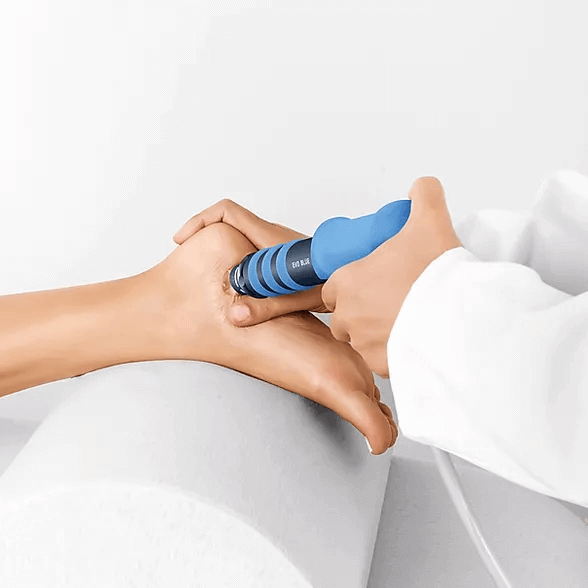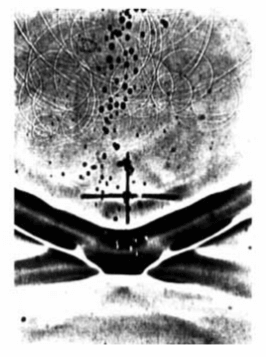Shock Wave Therapy for Plantar Fasciitis
I can’t improve my plantar fasciitis!
Plantar fasciitis can sometimes be a very stubborn condition.
First of all, we need to understand that, as per the last article, tendons change and adapt in reaction to load. However, in part due to their poor blood supply, these changes take longer to occur when compared to a muscle. This means that most of the times the condition is not that stubborn, but it is us who aren’t patient enough to take the rehab to the end.
Tendon Load And Capacity
If this loading approach is taken gradually and patiently, you’ll be able to load the tendon more and more, with slow but steady progress. This also means that day-to-day activities are less and less likely to go beyond the tendon’s capacity becoming a mildly exponential progress at some point.
In some cases, though, even being patient won’t do it and for some reason the pain remains. In these cases, assuming you are already doing the normal exercises and program, other treatments can be considered. One very important option is the Extracorporeal Shockwave Therapy, usually only called Shockwave Therapy(SWT).
What is Shock Wave Therapy?
“Shock Waves are movements of extremely high pressure caused by, for example, an explosion, an earthquake or a plane breaking the sound barrier. Shock Wave Therapy is the application and adaptation of Shock Waves for its use in medicine.”
EMS – Dolorclast

Shock Wave therapy is a non-invasive, virtually risk-free, non-time consuming approach that consists in the application of shock waves at an intensity and frequency that has been showed scientifically to lead to significant benefits in terms of pain and function. This technology is already used in the conservative management of kidney stones under the name of Extracorporeal Shockwave Lithotripsy.
What are the effects of shock waves in the living tissues?
Some studies suggest shock waves may also be applied to soft tissues inducing a cascade of biological reactions. As explained by Liu et al (2019), the dominant effect of shock waves is thought to be mechanotransduction (ie, activation/regulation through mechanical stimuli): rather than inducing damage in the target, SWT may induce tissue healing and creation of new blood vessels. Other evidence also suggests a role in the nervous system by reducing of pain felt by nerve fibers (Klonschinski et al, 2011) and by deactivating inflammatory mediators (Mariotto et al, 2009).Does Shockwave therapy work on Plantar Fasciitis?
Steroid Injections are an approach that also tends to be offered for the management of plantar fasciitis, though usually not as the first approach. The research teams of Xu (2019) and Mishra (2019) found both SWT and Steroid Injections to result in clinical improvement but SWT provided longer relief for people with plantar fasciitis. Dr Eslamian team has found that, even though Steroid Injections and SWT have similar outcomes, patients were more satisfied with SWT.
In general, studies and reviews tend to demonstrate improvement in pain and function achieved by SWT: Lou and colleagues (2017) concludes “SWT seems to be particularly effective in relieving pain associated with Plantar fasciitis”.
A study by Ibrahimi et al, shows that SWT is effective and safe for the management of Plantar Fasciitis with long-term follow-up of 2 year.
Is it possible to bypass the loading exercises, by doing ESWT in the acute stage?
There is no clear evidence about this yet, but a study by Rompe and colleagues (2010) seems to suggest that SWT was inferior to stretching for plantar fasciitis patients with less than 6 weeks of evolution.
So….
Is your heel in pain? Lakky Physiotherapy has all the above options available to help you manage your Plantar Fasciitis!
Get in touch!!
References:
- Liu T, Shindel AW, Lin G, Lue TF., Cellular Signaling Pathways Modulated by Low-intensity Extracorporeal Shock Wave Therapy, Int J Impot Res. 2019 May;31(3):170-176. doi: 10.1038/s41443-019-0113-3. Epub 2019 Jan 22
- Mariotto S., de Prati A.C., Cavalieri E., Amelio E., Marlinghaus E., Suzuki H. Extracorporeal shock wave therapy in inflammatory diseases: Molecular mechanism that triggers anti-inflammatory action. Curr. Med. Chem. 2009;16:2366–2372. doi: 10.2174/092986709788682119.
- Lohrer H, Nauck T, Korakakis V, Malliaropoulos N. Historical ESWT paradigms are overcome: a narrative review. Biomed Res Int. 2016;2016:3850461. doi: 10.1155/2016/3850461
- Klonschinski T, Ament SJ, Schlereth T et al (2011) Application of local anaesthesia inhibits effects of low-energy extracorporeal shock wave treatment (ESWT) on Nociceptors. Pain Med 12:1532–1537. https://doi.org/10.1111/j.1526- 4637.2011.01229.x
- Rompe JD, Cacchio A, Weil L, et al. Plantar fascia-specific stretching versus radial shock-wave therapy as initial treatment of plantar fasciopathy. J Bone Joint Surg Am. 2010;92:2514–2522
- Xu D, Jiang W, Huang D, Hu X, Wang Y, Li H, Zhou S, Gan K, Ma W., Comparison Between Extracorporeal Shock Wave Therapy and Local Corticosteroid Injection for Plantar Fasciitis. Foot Ankle Int. 2019 Nov 19:1071100719891111. doi: 10.1177/1071100719891111
- Mishra BN, Poudel RR, Banskota B, Shrestha BK, Banskota AK, Effectiveness of extracorporeal shock wave therapy (ESWT) vs methylprednisolone injections in plantar fasciitis. J Clin Orthop Trauma. 2019 Mar-Apr;10(2):401-405. doi: 10.1016/j.jcot.2018.02.011. Epub 2018 Feb 23
- Ibrahim M.I., Donatelli R.A., Hellman M., Hussein A.Z., Furia J.P., Schmitz C. Long-term results of radial extracorporeal shock wave treatment for chronic plantar fasciopathy: A prospective, randomized, placebo-controlled trial with two years follow-up. J. Orthop. Res. 2017;35:1532–1538. doi: 10.1002/jor.23403
- Lou J., Wang S., Liu S., Xing G. Effectiveness of Extracorporeal Shock Wave Therapy without Local Anesthesia in Patients with Recalcitrant Plantar Fasciitis: A Meta-Analysis of Randomized Controlled Trials. Am. J. Phys. Med. Rehabil. 2017;96:529–534. doi: 10.1097/PHM.0000000000000666.
- Eslamian F., Shakouri S.K., Jahanjoo F., Hajialiloo M., Notghi F. ExtraCorporeal Shock Wave Therapy Versus Local Corticosteroid Injection in the Treatment of Chronic Plantar Fasciitis, a Single Blinded Randomized Clinical Trial. Pain Med. 2016;17:1722–1731. doi: 10.1093/pm/pnw113
